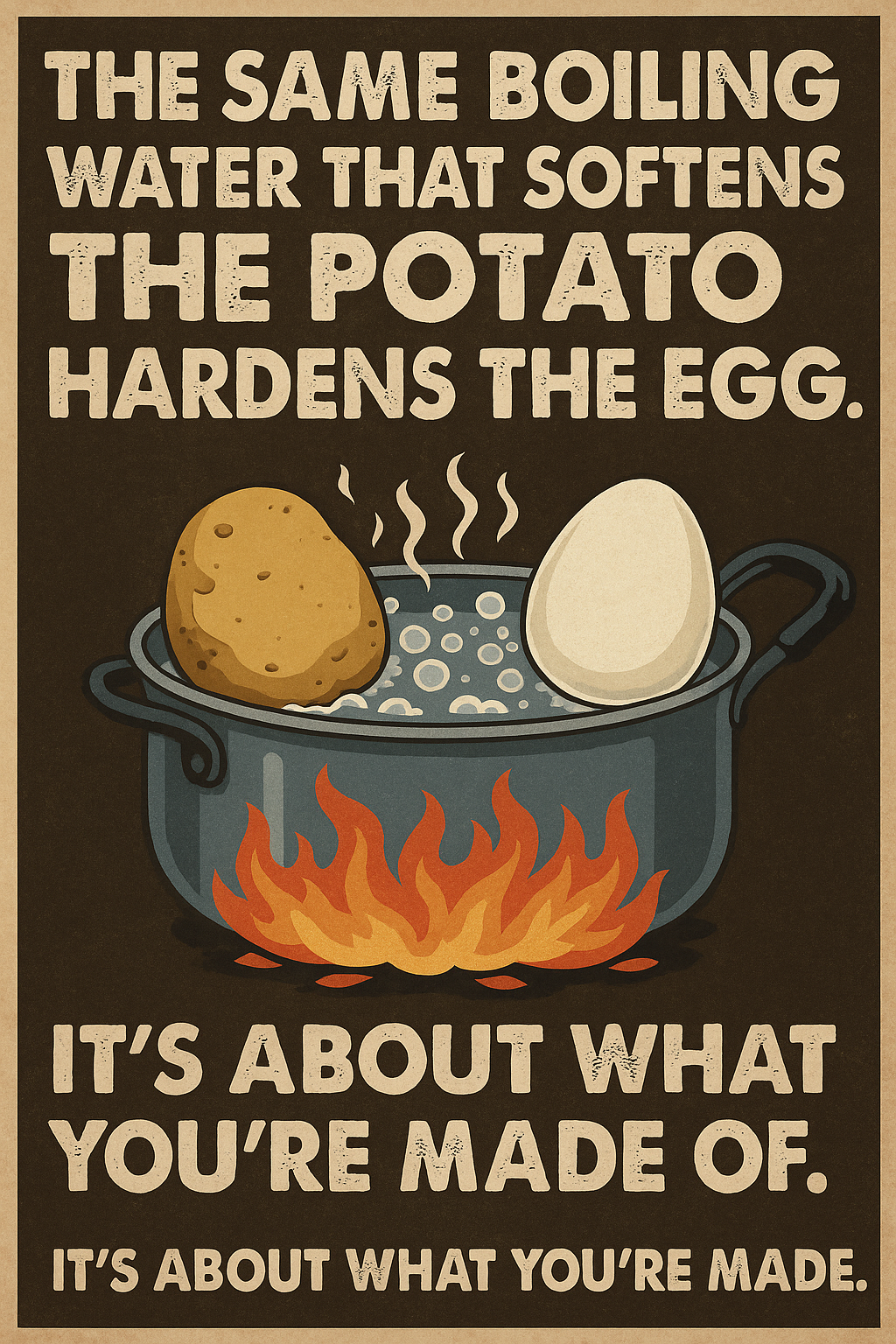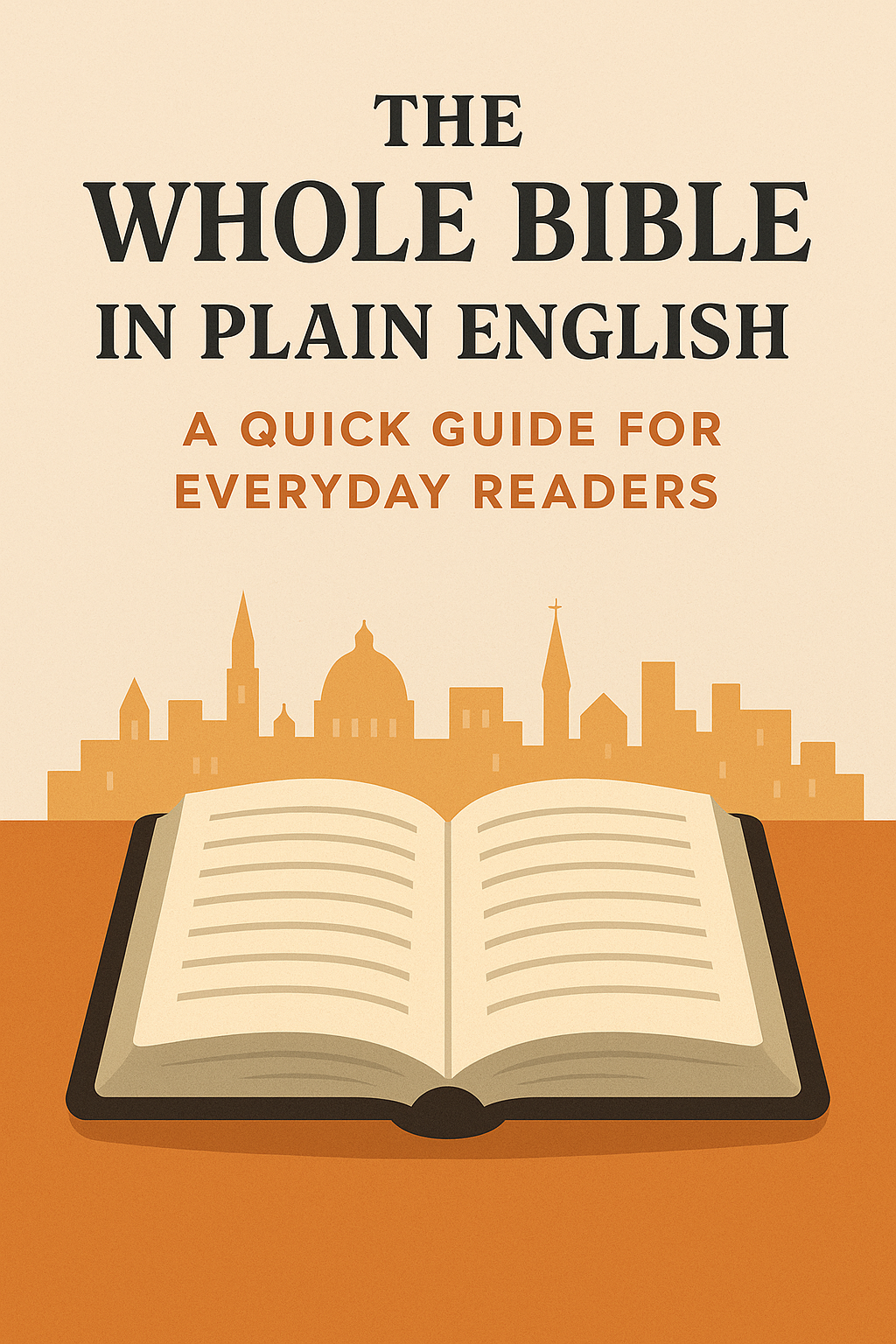“The same boiling water that softens the potato hardens the egg. It’s not the circumstances—it’s what you’re made of.”
This simple yet profound proverb has found its way into self-help seminars, motivational speeches, and trauma recovery rooms. But beneath its surface lies a deep well of spiritual, psychological, and philosophical wisdom. It tells us that the conditions of life—its stresses, pressures, heat, and turmoil—are neutral. They reveal and shape what is already inside us. It is not the water that determines the outcome; it is the substance immersed within it. One emerges softened, the other hardened. The difference? Not the water, but the internal constitution.
In our own lives, this metaphor unfolds daily. Whether we become bitter or better, broken or resilient, enslaved or transformed, is a function of our mindset, spiritual grounding, and moral orientation—not our circumstances.
Attitude: The First Filter of Meaning
Attitude is the lens through which we interpret reality. Just as the potato and egg respond differently to boiling water, so too do people respond differently to pain, pressure, and challenge. Two people can endure the same hardship—divorce, betrayal, poverty, illness—and yet one emerges stronger, more empathetic, more open; the other bitter, closed, angry.
Viktor Frankl, Holocaust survivor and author of Man’s Search for Meaning, wrote:
“Everything can be taken from a man but one thing: the last of the human freedoms—to choose one’s attitude in any given set of circumstances.”
In essence, attitude is our first rebellion against determinism. While we cannot control all that happens to us, we can control how we interpret it—and in that interpretation lies our transformation or our destruction.
Mindset: Fixed vs. Growth vs. Faith-Filled
Carol Dweck’s concept of fixed vs. growth mindset gives psychological weight to this analogy. The “egg” represents those who, under pressure, close up. Their core beliefs calcify. They resist change. They fear being wrong. Their identity becomes brittle, protecting a fragile ego.
The “potato,” by contrast, becomes tender in adversity—not weak, but pliable, open, teachable. This mirrors a growth mindset that asks, What can I learn from this? How can this grow me?
A faith-filled mindset goes even deeper:
“This trial is allowed by God for a higher purpose—even if I can’t see it yet.”
This echoes biblical truths:
“We rejoice in our sufferings, knowing that suffering produces endurance, and endurance produces character, and character produces hope.” —Romans 5:3-4
Heart of Peace vs. Heart of War (Arbinger Institute)
The Arbinger Institute describes two states of being: a heart of peace and a heart of war. The heart of peace is outward-looking, empathetic, curious. It sees others as people, not objects. It responds rather than reacts. It seeks to understand before being understood.
The heart of war, on the other hand, views others as threats, obstacles, or irrelevant. It dehumanizes, blames, and isolates.
When placed in boiling water:
- A person with a heart of war becomes the hardened egg, self-justifying their reactions, demanding control, and feeding on offense.
- A person with a heart of peace becomes the softened potato, holding space for complexity, responding with grace, and growing through trial.
Your state of heart is not something life assigns—it’s something you choose. Often, it is shaped by which voice you listen to: fear or faith, pride or humility, love or bitterness.
In the Box vs. Out of the Box (Arbinger/7 Habits)
Being “in the box” is a state of self-deception. It’s where we justify our own misbehavior by blaming others. We carry resentment, entitlement, and judgment while convincing ourselves we are right. It’s the hardened egg in metaphorical terms.
To be out of the box is to see clearly, to own our role, to break the cycle of reactivity and defensiveness. It is to be principle-centered, to soften our assumptions, and approach others as sacred souls.
The pressure of life reveals whether we are living in the box or out of it. Most people default to being in the box under pressure—blaming, resenting, justifying. But those who train their hearts in peace can step outside the box even in conflict.
Principle-Centered vs. Personality-Centered (Stephen Covey)
Stephen Covey draws a distinction between principle-centered living—where timeless values like integrity, justice, love, and humility guide behavior—and personality-centered living, where image, reputation, and external validation dominate.
- The potato is principle-centered: it yields to truth, learns from failure, and grows more tender in tribulation.
- The egg is personality-centered: it hardens to protect image, feeds off blame, and resists vulnerability.
Circumstances don’t forge character—they reveal it.
Feeding the Good Wolf vs. the Bad Wolf (Cherokee Parable)
An old Cherokee told his grandson:
“Inside every person there are two wolves. One is evil—anger, envy, sorrow, greed, arrogance. The other is good—joy, peace, love, hope, humility, kindness. The one that wins is the one you feed.”
Boiling water is just the battlefield. What matters is which wolf you’re feeding.
Do you nurse bitterness or cultivate compassion?
Do you meditate on grievances or on grace?
Do you feed fear or feed faith?
The wolf you feed determines whether you become tender-hearted or calloused.
Serving Two Masters and the Trap of Idolatry
“No one can serve two masters… You will hate the one and love the other…” —Matthew 6:24
We live in a culture of divided loyalties. Many try to serve God and comfort, truth and approval, justice and convenience. But the fire of affliction reveals which master we truly serve.
“The things you own, own you.” —Fight Club
When comfort is your idol, affliction will harden you. When approval is your god, rejection will destroy you. But when truth, virtue, and God are your center, even the flames refine rather than ruin you.
The Mirror of Suffering: What Are You Made Of?
Boiling water is a revealer, not a destroyer. It simply asks, What are you made of?
- Are you building your life on shifting sand or eternal rock?
- Are you tethered to values that last or to feelings that change?
- Are you being forged into strength or calcified in pride?
In the end, this parable isn’t about food. It’s about the soul.
The world is the water. Suffering is the heat.
You are the egg… or the potato.
Your response reveals your core.
The difference isn’t the conditions.
It’s the character.
It’s your attitude, your master, your wolf, your center.
It’s whether you live in peace or war, humility or pride, truth or delusion.
So ask yourself:
In the boiling moments of life… what are you made of?
And if you don’t like the answer, take heart—transformation is still possible.
But only if you’re willing to soften.





